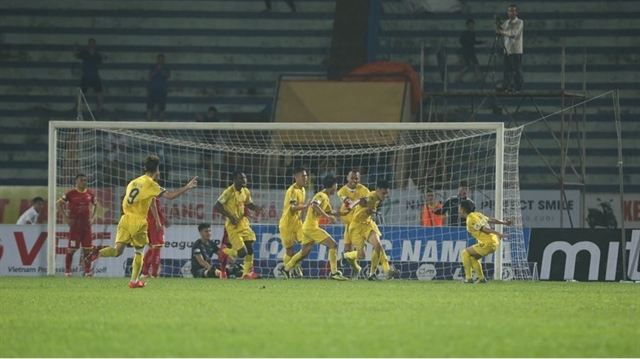
Nam Định's players celebrate one of their 23 goals this season. Photo vietnamnet.vn
Peter Cowan
It’s been more than two weeks since a ball was kicked in anger in professional Vietnamese football and I think I’ve come down with a bad case of GWS.
That’s goal withdrawal symptoms for the uninitiated.
To try and get my fix of net-busting magic, I’ve pored over the goal statistics compiled by V.League Stats on Facebook to try and glean a few insights into how exactly V.League 1 teams are putting the ball in the onion bag.
Please note this delve into the world of statistics and spreadsheets has absolutely nothing to do with having more time on my hands this week in home quarantine after my trip to Đà Nẵng. Nothing at all.
With 194 goals in 84 matches so far this season the V.League 1 averages 2.3 goals per game, close to the 2.52 per game in Spain’s La Liga, the lowest scoring of Europe’s big five leagues this season.
Of those 194 goals, 70 have come from set-pieces or penalties, meaning more than a third of goals are scored from dead balls, music to the ears of coaches who love running their players through elaborate corner routines on the training ground.
One such coach is likely Nguyễn Văn Sỹ of Nam Định.
The V.League 1’s surprise package have scored the joint-most goals this season with 23 and more than half of them have come via set-pieces, with two of the 12 being direct free-kicks from Brazilian forward Rodrigo Da Silva Dias.
By contrast, the league’s other top-scoring side get the vast majority of their goals from open play.
Of Hoàng Anh Gia Lai (HAGL)’s 23 goals, eight have come from what V.League Stats calls open play and nine from fast breaks, which I reckon translates as counter-attacks.
That means more than 73 per cent per cent of HAGL’s goals come from when the ball is in play, so it’s no wonder they’ve been looked at as the league’s most entertaining side.
However, with their five goals from the penalty spot also leading the league, it’s fair to say the men from Pleiku have benefited from more than their fair share of luck this season.
When goals are scored is an interesting avenue to explore.
Significantly more goals have been scored in the second half of games this season, with just 85 coming in the first half compared to 109 in the second.
This makes some intuitive sense as attacking space opens up the longer a match goes on as players tire, yet curiously, extremely late goals are nothing out of the ordinary in the V.League 1.
No fewer than 21 goals this season have been scored between the 91st and 100th minutes this season, making that 10-minute window the fourth-most common time for a goal to be scored.
Of course, football matches are only supposed to go 90 minutes plus extra time and we’ve seen some extremely long periods of extra time this season, with eight of those 21 goals being scored in the 95th minute or later.
I’ll let readers come to their own conclusions as to why exactly there is so much added time given by referees for so many late goals to be scored in, but needless to say whatever the reason, long live late drama, and long live goals. VNS
OVietnam